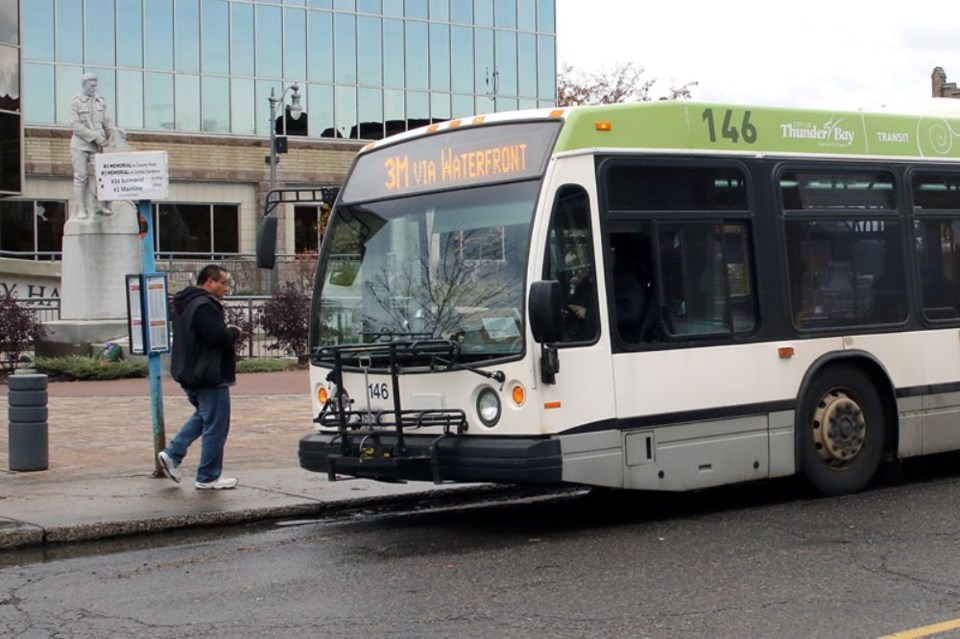Residents in Coun. Cody Fraser’s Neebing Ward are already getting a taste of the new model: the 4 Neebing route moved to on-demand service in the evenings in April 2020 as a temporary pandemic measure.
Ridership on the 4 Neebing had fallen to about four boardings per hour early in the pandemic. It already had the lowest ridership in the system before COVID at seven boardings per hour, compared to a fleet average of 42.
Residents in the area now book evening trips through the on-demand system, which uses smaller buses.
The city offers a similar service to those with disabilities through the Lift+ program, but it’s the first time transit has replaced a regular route with on-demand service.
City staff say Neebing and other low-ridership areas may be better served by the option.
At a Monday council meeting, Fraser vented his frustration that the city seemed to be skipping adequate study and consultation on those plans.
“I feel like I’ve been pretty patient with this, and I’ve been giving everyone the benefit of the doubt because of COVID, but to be frank, I’m quite upset with how this has all unfolded, and my residents are quite upset,” he said.
A report from Thunder Bay Transit lists numerous areas aside from the Neebing route that could be considered for on-demand service.
Those include the 6 Mission route serving Fort William First Nation, Parkdale, the Aviation Centre of Excellence, and various seniors residences, including Hogarth Riverview Manor and Chartwell Hilldale Retirement Centre.
Some of those areas have no current transit service, while others are served by regular bus routes.
Fraser worried Monday the change to on-demand could come without warning or a decision of council. City staff said that was not the case.
“We wouldn’t do that at the drop of a hat,” said transit manager Brad Loroff. “We’d come to council, we'd explain the rationale of our recommendation, and… we'd take action based on council agreeing with the recommendation."
Still, Fraser said he’s unhappy with how the process has been handled.
The city initially planned to launch a pilot project in January fully replacing the 4 Neebing route with on-demand service.
Fraser said the report presented Monday, which makes no mention of a pilot, left him with the impression “it’s just kind of a foregone conclusion this is going to happen.”
He’s concerned the city is in talks with Uber to procure software for the program, allowing users to book rides with a smartphone app or online (passengers must currently call the transit office at least a day in advance).
“It seems we’re inching closer to full implementation without proper consultation or a direct decision of council,” Fraser said Monday. “We’re out trying to procure software for a program we haven’t even agreed to do yet. I can’t help but feel like council is becoming a rubber stamp for bureaucratic decisions.”
Loroff said while it will be up to council whether to implement it, there are indications the on-demand model would benefit riders and save the city money.
The evening on-demand service in Neebing has served as a pilot of sorts, he said.
“It has verified some original assumptions we had that it’s more cost-effective to provide [similar] levels of service – I would actually say better levels of service – at a reduced cost.”
Data on usage and costs of the Neebing on-demand service are not yet available, Loroff said, but will be presented to council in a report. He couldn't yet say when that would happen.
Municipal transit services have been encouraged by the province to explore on-demand service, he said.
“On-demand micro-transit is already a proven model,” he said. “It’s employed by a number of different transit agencies across the country.”
That includes some smaller northern cities like Sault Ste. Marie, which offers on-demand transit on weekend evenings.
To Fraser, the model seems like an inherently lower level of service.
“The way I view this is my residents will be getting less and paying the same amount,” he said. “In my opinion, not having continuous service isn’t the same level of service as the rest of the city, whether you [can] call and book a ride or not.”
He hasn’t heard much feedback on the evening on-demand service from users, he said.
Neebing residents pay for transit through a special arrangement, since the area is classified as a rural settlement zone and wouldn’t normally receive full city services.
Fraser said the shift to on-demand has raised the question of whether that arrangement is worthwhile.
“There’s a conversation happening among individuals who use the service who are concerned about going to micro-transit,” he said. “There are also some concerns among residents who don't utilize the service that they’re tired of paying the transit line on their tax bill.”
Transit accounts for around 4.8 per cent of municipal taxes, working out to around $160 per year for the median residential property.
Fraser said despite relatively low ridership, the regular 4 Neebing route is valuable.
“It’s a great service, we pay for it… and it’s in my view well utilized by those who need it,” he said.
